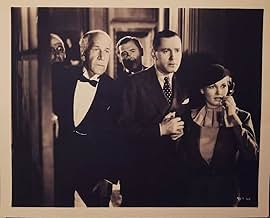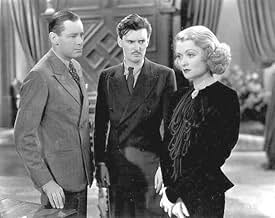A woman's trials and tribulations over a romance since childhood, protecting her husband's secret past, and the trouble it causes with her brother.A woman's trials and tribulations over a romance since childhood, protecting her husband's secret past, and the trouble it causes with her brother.A woman's trials and tribulations over a romance since childhood, protecting her husband's secret past, and the trouble it causes with her brother.
Leo G. Carroll
- Dr. Conrad Masters
- (as Leo Carroll)
Wilson Benge
- Fenwick's Butler
- (uncredited)
Sidney Bracey
- Napier's Butler
- (uncredited)
Leonard Carey
- Martin - Passerby
- (uncredited)
André Cheron
- French Waiter
- (uncredited)
Claudia Coleman
- Second Gossiper
- (uncredited)
Adrienne D'Ambricourt
- French Nun
- (uncredited)
Grace Hayle
- First Gossiper
- (uncredited)
Featured reviews
Hollywood's British colony with the exception of star Constance Bennett filled
out the roles in this drama about the British upper classes. I know that American
audiences during the Depression did like to see how the upper crust lived. But
these noble sacrificing people were a bit much.
Herbert Marshall who appeared regularly in these kind of dramas is going out with Bennett. But dear old dad disapproves because of the unsavory reputation she and brother Hugh Williams have. Henry Stephenson was always playing these upper crust British types as the British like to see themselves is the father.
As a dutiful son and member of Parliament he obeys. Marshall even makes a more suitable match in Elizabeth Allan. As for Bennett she nobly sacrifices herself and Williams does likewise.
A little honesty all around and none of these plot situations would have developed. Outcast Lady should stay outcast.
Herbert Marshall who appeared regularly in these kind of dramas is going out with Bennett. But dear old dad disapproves because of the unsavory reputation she and brother Hugh Williams have. Henry Stephenson was always playing these upper crust British types as the British like to see themselves is the father.
As a dutiful son and member of Parliament he obeys. Marshall even makes a more suitable match in Elizabeth Allan. As for Bennett she nobly sacrifices herself and Williams does likewise.
A little honesty all around and none of these plot situations would have developed. Outcast Lady should stay outcast.
This is an MGM chick flick, 1934- style. Constance Bennett, a first class actress, is Iris, a penniless heiress (I'm still trying to get my brain around how she and her drunken brother can live so well despite their circumstances... they have servants who work whilst politely grumbling over not being paid) who loves the Napier, (Herbert Marshall) son of a prominent English family with interests in India. His father (Henry Stephenson) bans their marriage and each goes off in different directions while carrying awfully large torches for each other. My problems with the production: 1) Marshall is ill-fitted as the somewhat spineless son--- he's 44 here (!) 2) Stephenson is a real one-dimensional turd until the big revelation. 3) The ending (I won't give it away, but it doesn't really fit with Iris' temperament). Connie Bennett ranks (along with Kay Francis and Bebe Daniels) as one of the most underrated actresses around and is always fascinating to watch... even in pedestrian soap like this.
How an actress so magnificent is not more celebrated leaves me shaken with incomprehension.
I love her in comedies such as "My man Godfrey" and "Merrily we live" but in this she suffers so gallantly and beautifully. In my first feature film I style Elizabeth Mcgovern after her and in this film she shimmers and shines.
I cannot recommend it more.
See it and love it and cherish it.
Her sister Joan always said she knew who she was and what she could bring to the screen and boy in this does she deliver the goods.
I love her in comedies such as "My man Godfrey" and "Merrily we live" but in this she suffers so gallantly and beautifully. In my first feature film I style Elizabeth Mcgovern after her and in this film she shimmers and shines.
I cannot recommend it more.
See it and love it and cherish it.
Her sister Joan always said she knew who she was and what she could bring to the screen and boy in this does she deliver the goods.
The second film based upon Michael Arlen's novel The Green Hat (previous is the silent A Woman of Affairs with Greta Garbo). This sound version stars the lovely and talented Constance Bennett in the lead as a woman whose background precludes an English aristocratic family from accepting her as one of their own when the Herbert Marshall's character falls in love with her. The rest of the movie revolves around this star-crossed love and the consequences of trying to do the right thing instead of following your heart. I found Marshall's performance too wooden but it is offset by excellent supporting characters. The story line appears to suffer from cuts in content that cause inadequate transitions. Fans of Constance Bennett will be amused at the similarity of the ending of this film to one of the main events in a follow-on work, Topper. An interesting, but not completely satisfying film that probably bears comparison to the original novel. Gowns by Adrian.
Constance Bennett is terrific in this not so terrific film. Late in life she told an interviewer she was no Sarah Bernhardt but her self-appraisal was off target and doesn't apply to her performance as the outcast lady. MGM filmed this story in 1929 with Garbo and audience comparison of the 2 interpretations may have been a factor in the 1934 version's box-office failure. Or maybe it was something else.
In the early scenes Iris is a young woman in love, bubbling with happiness, for she's about to marry her true love, played by Herbert Marshall. But Marshall is miscast. He's too old to play Napier, Iris childhood playmate, who allows his father to make major life decisions for him. Iris and Napier don't marry. Years later, Iris marries 'Boy', a man with a secret, which she discovers on her wedding day. Boy's response to her discovery is incredible. Iris then makes her own incredible decision that results in the ruination of those she loves as well as herself. Iris tells a lie. This saves Boy's reputation while destroying her own. More years later, the truth is revealed, but it's too late to be of use to anyone. That Bennett succeeds in making these incredible happenings credible is impressive.
And Bennett is graceful and alluring on the dance floor. A wonderful scene shows the pleasure seeking merry widow in her Adrian gown dancing the tango in a nightclub on the Riviera. She does appear to be enjoying herself and her partner. But we know better. Under that gay exterior there beats the broken heart of a noble woman. Or something like that.
Variety's reviewer wrote, "It's a very good acting job by Constance Bennett and if the story hadn't been such a patch-quilt it might have been one of her memorable performances." I agree. The story is to blame. BTW, the secret Iris guarded is somewhat mysterious. Being referred to as Boy's "purity" has misled today's viewers, but the audience of 1934, especially the males, would have known that Boy had a disease, at that time incurable and considered so shameful that it was spoken of only in confidence with one's doctor. MGM's genius producer, Irving Thalberg, as well as the Production Code were responsible for this hash.
In the early scenes Iris is a young woman in love, bubbling with happiness, for she's about to marry her true love, played by Herbert Marshall. But Marshall is miscast. He's too old to play Napier, Iris childhood playmate, who allows his father to make major life decisions for him. Iris and Napier don't marry. Years later, Iris marries 'Boy', a man with a secret, which she discovers on her wedding day. Boy's response to her discovery is incredible. Iris then makes her own incredible decision that results in the ruination of those she loves as well as herself. Iris tells a lie. This saves Boy's reputation while destroying her own. More years later, the truth is revealed, but it's too late to be of use to anyone. That Bennett succeeds in making these incredible happenings credible is impressive.
And Bennett is graceful and alluring on the dance floor. A wonderful scene shows the pleasure seeking merry widow in her Adrian gown dancing the tango in a nightclub on the Riviera. She does appear to be enjoying herself and her partner. But we know better. Under that gay exterior there beats the broken heart of a noble woman. Or something like that.
Variety's reviewer wrote, "It's a very good acting job by Constance Bennett and if the story hadn't been such a patch-quilt it might have been one of her memorable performances." I agree. The story is to blame. BTW, the secret Iris guarded is somewhat mysterious. Being referred to as Boy's "purity" has misled today's viewers, but the audience of 1934, especially the males, would have known that Boy had a disease, at that time incurable and considered so shameful that it was spoken of only in confidence with one's doctor. MGM's genius producer, Irving Thalberg, as well as the Production Code were responsible for this hash.
Did you know
- TriviaThe Hays office refused to sanction the movie under its original tile, "The Green Hat." Michael Arlen's original novel had acquired a salacious reputation, so MGM reluctantly changed it. They were not even allowed to use it as a screen story credit.
- GoofsWhen Napier first arrives, he states it's been five years since he's been there. Later, when he's in the car with Iris, she states she wrote a poem about him when he first went away to India - three years ago.
- ConnectionsVersion of Intrigues (1928)
Details
- Release date
- Country of origin
- Languages
- Also known as
- Iris March
- Filming locations
- Production company
- See more company credits at IMDbPro
- Runtime
- 1h 17m(77 min)
- Color
- Aspect ratio
- 1.37 : 1
Contribute to this page
Suggest an edit or add missing content























